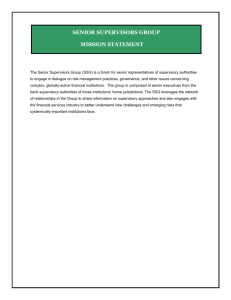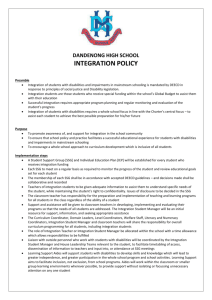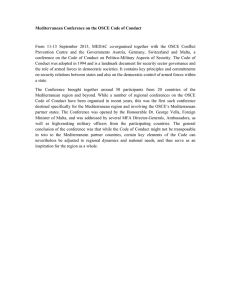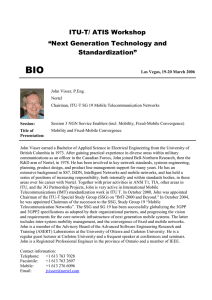The Role of the Organization for Security and
advertisement
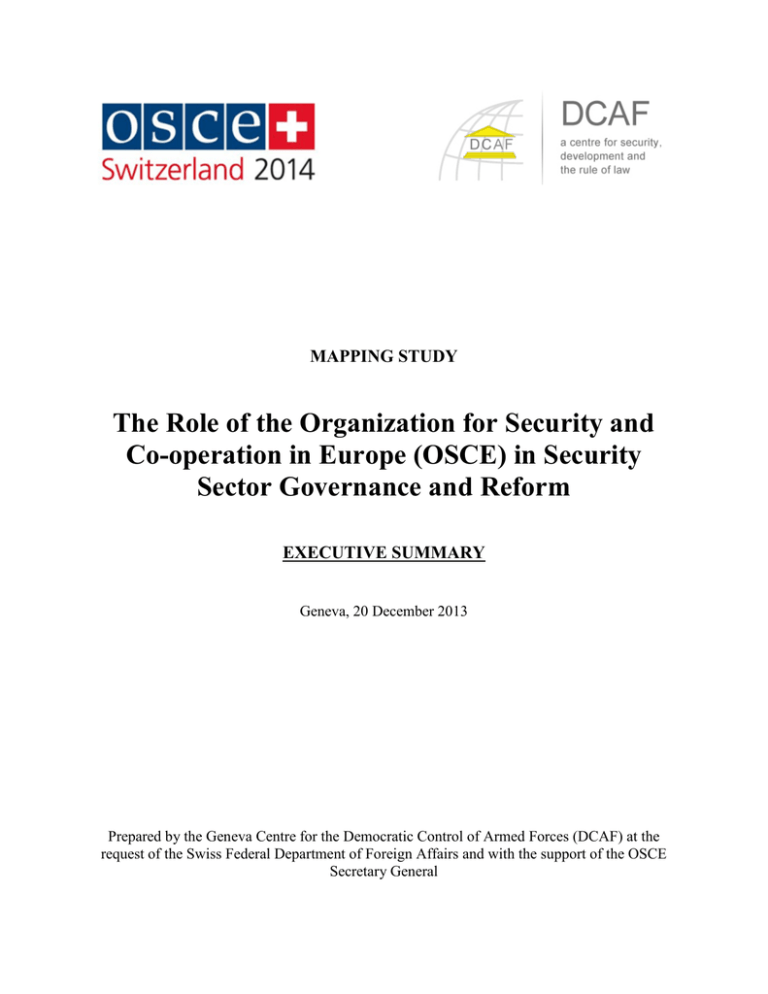
MAPPING STUDY The Role of the Organization for Security and Co-operation in Europe (OSCE) in Security Sector Governance and Reform EXECUTIVE SUMMARY Geneva, 20 December 2013 Prepared by the Geneva Centre for the Democratic Control of Armed Forces (DCAF) at the request of the Swiss Federal Department of Foreign Affairs and with the support of the OSCE Secretary General Executive Summary of the Final Report 1. Security sector governance and security sector reform are increasingly recognized by the Organization for Security and Co-operation in Europe (OSCE) and its participating States as playing an essential role in peacebuilding, conflict prevention, early warning and crisis management. The OSCE’s comprehensive and multidimensional approach to security is understood to add value to efforts in the area of security sector governance and reform (SSG/R). At the normative level, SSG/R concerns are reflected in many of the principles and concepts developed by the organization, with the Code of Conduct on Politico-Military Aspects of Security taking a prominent role. At the operational level, the OSCE is actively engaged in supporting SSG/R activities through its Secretariat, institutions and field operations. While the organization has a wealth of experience in this domain, activities are not implemented as part of a common and coordinated OSCE approach to SSG/R. Concerns have been raised that this lack of coherence has limited the effectiveness of its assistance in both scope and impact. Strong calls have emerged from the OSCE’s Secretariat, institutions and field operations for it to develop a coherent approach to SSG/R, understand its comparative advantages in this area and reflect on synergies between related areas of SSG/R support. 2. Against this background, and in preparation for its upcoming Chairmanship of the OSCE in 2014, Switzerland, with the support of the Secretary General of the OSCE, has mandated the Geneva Centre for the Democratic Control of Armed Forces (DCAF) to conduct a study on the role of the OSCE in SSG/R. The aim is to achieve an enhanced understanding of the extensive engagement of the organization in SSG/R; identify its comparative advantages; and reflect on how to enhance the coherence of its activities. The study is not an evaluation of OSCE support to SSG/R, but a review based on empirical findings aimed at identifying lessons to be learned and, on this basis, developing concrete recommendations for further discussion. In particular, it seeks to feed into broader debates on how the OSCE can improve the effectiveness and efficiency of its support, and contribute to greater coherence and sustainability in the provision and impact of this support. 3. The methodology for the study is threefold, drawing on desk research, semi-structured interviews and case studies. The desk research consisted of examining primary and secondary sources, including the organization’s various key documents, annual reports, press releases, etc. The semi-structured interviews were conducted between 1 October 2012 and 30 September 2013. Over 170 interlocutors were interviewed, including representatives of the OSCE Secretariat, institutions and field operations, as well as representatives of national authorities, civil society and the international community. From a sample of 15 current field operations, four were selected, namely Bosnia and Herzegovina, Kyrgyzstan, Serbia and Tajikistan – thus two from each of the two major regions in which the OSCE is engaged through its field support. 4. Following brief remarks on the concepts and methods on which the study is based, this report presents the main findings in three parts: the mapping overview, mainly based on desk research combined with a few interviews, outlines the OSCE’s normative and operational roles in SSG/R; the comprehensive review, which is largely based on interviews and field research, surveys the OSCE’s de facto approach to SSG/R support at the strategic, thematic and programmatic levels, and, on this basis, identifies ten key lessons on how the organization can enhance the coherence of its support; and finally the main conclusions from both the mapping and the comprehensive review, accompanied by a set of recommendations aimed at the OSCE and its various bodies. Mapping Overview Normative Roles of the OSCE in SSG/R 5. The mapping overview demonstrates that the OSCE is extensively engaged in SSG/R at both normative and operational levels. Its main normative role consists of the elaboration of SSG/Rrelated principles and standards through the development of its relevant commitments and policy framework. These principles include, among others, supporting democratic control of the security sector in a framework of the rule of law, promoting transparency and accountability, respecting human rights and strengthening gender responsiveness. The OSCE Code of Conduct on PoliticoMilitary Aspects of Security is widely considered as the normative cornerstone for the democratic control of armed forces and provides a basis for many of the cardinal principles of SSG/R. Although the normative framework is relatively extensive, it is also fragmented and missing a common and holistic approach. The framework provides the basis for the operational roles of the OSCE in the provision of SSG/R support. Operational roles of the OSCE in SSG/R 6. A distinction should be made between the operational roles of the Secretariat, institutions and field operations. While a number of Secretariat entities and OSCE institutions are engaged in supporting SSG/R, it is possible to characterize their assistance as support to participating States, support to OSCE Partners for Co-operation and advice to field operations. The entities of the Secretariat are engaged in between a minimum of one to a maximum of ten SSG/R-related activities (particularly in the areas of border security reform, police reform and cross-dimensional issues). The relevant institutions, in particular the Office for Democratic Institutions and Human Rights (ODIHR) and the High Commissioner on National Minorities (HCNM), are engaged in one to eight SSG/R-related activities (from police reform and judicial reform to civil society oversight of the security sector). In the case of the field operations, while only five operations have an explicit mandate for supporting SSG/R-related activities (particularly in the areas of police reform and border security reform), all 15 current operations are in one way or another engaged directly or indirectly in such work. Most field operations engage on average in six to ten SSG/R activities. The majority are involved in the areas of reforming the police, border security and judiciary, as well as SSG/R in the broader context of combating trafficking and anticorruption and anti-terrorism efforts. Comprehensive Review The OSCE’s de Facto Approach to SSG/R Support 7. As the mapping overview shows, the OSCE is heavily engaged in supporting SSG/R-related activities, even if this is not done under the heading of SSG/R and not necessarily in full compliance with the concept. In practice, however, it is possible to identify elements of a de facto approach to SSG/R pursued by the OSCE, unintended or not, as reflected across three levels: strategic, thematic and programmatic. 8. At the strategic level, provision of support is heavily influenced by the organization’s planning culture. Strategic planning is a challenge for the OSCE which expands beyond the area of SSG/R. However, SSG/R requires meticulous planning for long-term change as well as to identify entry points to pursue enhancing the effectiveness of the security sector and also its accountability – which is the more challenging and long-term need. In practice, the OSCE is not yet actively engaging with the concept of SSG/R as a strategic approach to support, although there are some exceptions. For instance, the Secretariat’s Strategic Police Matters Unit has called for an approach to SSG/R in the reports of the OSCE Secretary General to enhance linkages between police reform and criminal justice reform. ODIHR has also used the concept in its work in the area of human rights, gender and security issues. Finally, the field is increasingly starting to recognize its value. In particular, several field operations have either begun to address SSG/R through their departmental projects or are calling for such an approach. The value added of developing a strategic approach to SSG/R is generally raised by staff as enabling greater coherence among reform efforts on the basis of developing goals towards which different entities work; strengthening prioritization of activities; bringing together the numerous commitments at the strategic level and establishing linkages between strategic and programming levels; encouraging cross-dimensional coordination and cooperation; and enabling field operations to engage with the host country on SSG/R with the necessary legitimacy. 9. At the thematic level, while a coherent approach to SSG/R would promote a strong focus on civilian management and democratic oversight of the security sector, in practice this has not been a strong element of support. However, topics related to addressing transnational threats have often received a significant proportion of support. There are exceptions, though, as demonstrated by the two field operations in Southeastern Europe, where significant efforts have been allocated to strengthening parliamentary oversight of the security sector. Also, ODIHR’s work in strengthening civil society oversight through its support in the area of trial monitoring must be highlighted. However, beyond these examples, building parliamentary and civil society oversight in the first dimension has been relatively weak, often limited to inviting representatives to meetings. Second, in the case of the field operations in Central Asia, a certain resistance towards engaging thematically in governance aspects of SSG/R could often be perceived, possibly because of a lack of understanding of the value of this, not knowing entry points, or a fear of resistance from national counterparts. While it is recognized that engaging in governance issues can be delicate work, there are nonetheless entry points which need to be further explored. 10. At the programmatic level, a coherent approach to SSG/R support would ensure that operational support is provided in a way that strengthens national ownership and ensures sustainability. While a significant amount of the OSCE’s engagement in this area has been based on awareness-raising or facilitating exchanges of experience, its support has grown increasingly technical, such as through the provision of training. There is the risk, though, that little emphasis is placed on ensuring that this knowledge transfer is made sustainable through, for example, anchoring support at the institutional level by revising training curricula, strengthening national academies, etc. There is a need to emphasize that training is a means to an end and not the objective of the programmes. Lessons Identified from the OSCE’s Experience in SSG/R Support 11. While the OSCE, despite the absence of an overarching policy framework, is quite heavily engaged in supporting SSG/R-related activities, from a holistic SSG/R perspective these activities often lack coherence and sustainability. A number of key lessons can be drawn from the OSCE’s experience in the SSG/R area to date, and these would need to be addressed if the organization is to embark on developing a coherent, overarching approach to SSG/R support. The lessons also provide numerous insights into how the OSCE could enhance the effectiveness and efficiency of its SSG/R-related support to participating States. The ten key lessons identified in the study are as follows. First, there is a pressing need for an overarching framework for SSG/R which would address several of the coherence issues discussed above with regard to support at the strategic, thematic and programmatic levels. Second, there is a need for the OSCE to adopt an explicitly cross-dimensional approach to SSG/R – meaning not only that all three dimensions are part of SSG/R, but also that the linkages between them are actively encouraged through an integrated approach to support. This requires developing an understanding of where the cross-dimensional synergies lie. Third, there is a need to identify and build on the OSCE’s comparative advantages. This includes, for example, field operations taking advantage of their broad comprehensive approach to security combined with their quality of often being a trusted partner of the host government, to support more strategic-level discussions on the needs and priorities for SSG/R within the host country. Fourth, the OSCE should enhance the sustainability of its SSG/R activities, which entails developing more impact-oriented support as well as reflecting more on how to ensure national ownership through the building of sustainable national institutions and capacity. Fifth, enhanced engagement with civil society is needed. While the human dimension is often strong in this regard, this approach has not always been shared by the first dimension. As such, there is a clear need to raise awareness on the value of engaging with civil society across all three dimensions, and to identify entry points for this support. Sixth, a clear delineation of roles and responsibilities in the OSCE’s support to SSG/R is required. In particular, reflection is needed on how coherence between the roles of the Secretariat and institutions in relation to the roles of field operations can be enhanced. Seventh, linked to the above, effective coordination in SSG/R support should be enhanced, particularly at the strategic level. The field operations, for instance, have offered innovative examples of how coordination can be enhanced through the development of strategic objectives on which every department should report with regard to the cooperative efforts to be undertaken towards their achievement. Eighth, there is a need to adapt SSG/R support to the human resources available, because the impact one can expect to see achieved is correlated to the available expertise and the capacity allocated. Moreover, enhanced efforts could be made to ensure that the right skill sets are identified and/or developed among the staff. Ninth, SSG/R support should be adapted to the available financial resources, notably through the conduct of assessments to prioritize resources, and by encouraging enhanced joint programming where there is potential for synergies. Finally, tenth, significant investment is required in the area of monitoring and evaluating SSG/R efforts. This could help to move the organization away from the current perception that the OSCE is at times “throwing seeds which they hope will eventually flourish”. Conclusions and Recommendations Conclusions 12. The main conclusion which flows from the comprehensive review is that there is a need to develop a coherent OSCE approach to SSG/R support, ideally based on a strategic framework for this broad area of activities. Such an approach would contribute to strengthening the OSCE’s comprehensive approach to security, as it implies building on the cross-dimensional aspects of support. While there are various other angles from which the OSCE could frame its engagement, SSG/R has many advantages. First, it is broad enough to cover a large number of OSCE activities, and thus support much-needed efforts to enhance the coherence and effectiveness of the organization. Second, it is the only framework which underlines the need for certain minimum principles to be upheld, many of which are in line with a number of existing OSCE commitments. Essentially, without a clear strategic approach to SSG/R, it is possible to cherrypick support and provide assistance in the areas of, for instance, equipment or training without reflecting on the bigger goal of enhancing the safety of the people. Finally, in practice, the field is already driving a nascent approach to SSG/R – that is to say, while the Secretariat and institutions have often only superficially engaged with SSG/R as a concept, the field operations are in practice increasingly trying to use it as a framework for support. Given this reality, the OSCE can no longer afford to provide SSG/R support without basing it on some kind of strategic guidance. 13. It is also important to note that the OSCE has much to offer as a regional actor engaged in SSG/R support. It has a number of potential comparative advantages, which if identified and built upon could significantly enhance the impact of its support. For instance, given its reputation of a neutral partner and its broad approach to security, it could play a stronger role in providing support to participating states in SSG/R at the strategic level, e.g. national security policies and component-level strategies. This can support national ownership by empowering national prioritization of reform needs. Linked to this, there were calls from both national and international counterparts in the field for the OSCE to play a stronger role in enhancing international coordination in this area. The OSCE is perceived as a legitimate actor to begin a discussion among the international community on needs, gaps and means to address them, but the organization is currently not able to live up to this as it rarely engages in assessments. The OSCE could also make more use of its political influence to raise awareness of those issues addressed in its commitments which may be perceived as sensitive and thus do not advance in certain contexts. Regarding field operations, it could draw on its numerous field offices to identify the priorities of SSG/R at the local level and help integrate these into strategic discussions on reform. It is also one of the few actors to benefit from good relationships with both governments and civil society, thus suggesting that the OSCE should engage more in a role of building trust between these groupings, particularly on first-dimension issues where this is often lacking. Recommendations 14. A number of preliminary recommendations can be derived from the mapping and the comprehensive review on which this report is based. On a general level, there are recommendations that, while highly relevant to enhancing the OSCE’s support to SSG/R, are also broad in nature and can be applied to the OSCE overall. For instance, one of the principal recommendations is to include the results of the mapping study in the Helsinki+40 process. The study highlights that in the organization’s support to this area there are numerous opportunities to enhance the efficiency and effectiveness of the OSCE as well as the impact it can have. Consideration could be given to establishing an additional working group, organizing a seminar on this topic and/or developing a concept paper to enable addressing these lessons formally within the Helsinki+40 process. Other recommendations that could contribute to this process relate to reviewing the roles and responsibilities of the Secretariat, institutions and field; strengthening the OSCE’s approach to planning, monitoring and evaluation; and enhancing the OSCE’s knowledge management system. 15. Among recommendations at the strategic level which are intended to enhance the OSCE’s approach to SSG/R, a key recommendation is to develop a strategic framework for SSG/R. The framework should define the goals of SSG/R from an OSCE perspective, clarify how all three dimensions can contribute to these goals and incorporate many of the key lessons outlined in this study. Such a framework should be developed at the strategic level, and not be linked to any dimension or department. This may require the framework document to be drafted by an OSCEwide task force which would include representatives from the Secretariat and institutions, and have strong consultation with the field and/or be under direct supervision of the Chairmanship. This would be a strong message that SSG/R is a truly cross-dimensional area of activity. Other recommendations include raising political awareness on the OSCE’s approach to SSG/R; establishing an OSCE-wide inter-institutional working group or task force on SSG/R; and engaging with the United Nations on approaches to supporting SSG/R under Chapter VIII of the Charter. 16. On an operational level, SSG/R-related recommendations are targeted to the various OSCE audiences. At the level of the Secretariat and institutions, one such recommendation is the need to highlight the importance of the Code of Conduct on Politico-Military Aspects of Security as a fundamental principle of SSG/R. The Code has the potential to provide an entry point to supporting some of the more sensitive aspects of SSG/R, such as democratic oversight of the security sector and budgetary transparency. The Secretariat should further invest in awarenessraising on the Code among its own staff, and ensure that outreach seminars on the Code are impact-oriented. Other recommendations to the Secretariat and institutions include developing guidance, training, and relevant tools on an OSCE-wide approach to SSG/R, as well as facilitating the exchange of experiences in SSG/R between field operations. At the level of the field operations, one of the central recommendations is the need to develop a strategic vision for SSG/R support which is country-specific and would support prioritization on the basis of needs and available resources.
